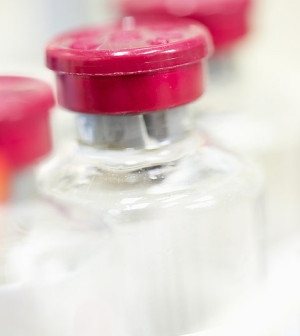- Could Your Grocery Store Meat Be Causing Recurring UTIs?
- Are You Making This Expensive Thermostat Error This Winter?
- Recognizing the Signs of Hypothyroidism
- 10 Strategies to Overcome Insomnia
- Could Artificial Sweeteners Be Aging the Brain Faster?
- Techniques for Soothing Your Nervous System
- Does the Water in Your House Smell Funny? Here’s Why
- Can a Daily Dose of Apple Cider Vinegar Actually Aid Weight Loss?
- 6 Health Beverages That Can Actually Spike Your Blood Sugar
- Treatment Options for Social Anxiety Disorder
New Drug Shows Promise for MS


An experimental drug appears to repair nerve damage seen in multiple sclerosis (MS) patients, results of an early trial suggest.
MS, an often disabling disease of the central nervous system, damages myelin, the fatty substance that protects nerves.
Now, for the first time, researchers show evidence of repair of damaged myelin in the human brain, said lead researcher Dr. Diego Cadavid, who is with Massachusetts-based Biogen Idec, which makes the drug and funded the trial.
The trial was the second of three phases required for U.S. Food and Drug Administration approval of the drug, known as anti-LINGO-1.
“These data support our ongoing development of anti-LINGO-1,” said Cadavid.
The trial included 82 people with acute optic neuritis, an eye problem that causes inflammation, damage to nerve fibers and loss of myelin within the optic nerve. About half of those with optic neuritis go on to develop multiple sclerosis.
Patients who received the experimental antibody had greater improvement in nerve function than those who received a placebo, the researchers found.
The results are to be presented April 22 at the annual meeting of the American Academy of Neurology in Washington, D.C. Data and conclusions presented at meetings are usually considered preliminary until published in a peer-reviewed medical journal.
Still, experts are enthusiastic about the findings.
“Just a few years ago, the idea of nervous system repair was only a dream,” said Bruce Bebo, executive vice president for research at the National Multiple Sclerosis Society.
“Finding ways to restore myelin holds significant promise as a strategy to restore the function that multiple sclerosis has taken from people and reducing or stopping multiple sclerosis progression,” he said.
Dr. Paul Wright, chairman of neurology at North Shore University Hospital in Manhasset, N.Y., said this is “a very exciting” initial trial.
“What they found is really cool,” said Wright. “We are not just interested in treating a disease, we are interested in correcting a disease process.”
For the study, Cadavid and his colleagues gave patients high doses of steroids before randomly assigning them to anti-LINGO-1 or placebo.
Every four weeks patients received a dose of anti-LINGO-1 until six doses were given. Participants were then assessed every four weeks for six months. They underwent a final assessment at eight months.
Optic neuritis usually affects just one eye. The researchers measured improvements in the optic nerve of the affected eye, comparing it with the normal eye, by measuring the speed of electrical impulses through the nerve.
People treated with anti-LINGO-1 had significantly improved nerve repair compared with people who received the placebo — 34 percent greater at six months and 41 percent at eight months, the researchers said.
Moreover, more than half of people treated with the drug saw a return to normal or near normal function, compared with 26 percent of patients who received the placebo, the researchers found.
However, it will take larger trials with more patients before this treatment could become a regular therapy for multiple sclerosis, Wright said.
“The hope for this drug is that in people who have multiple sclerosis, or any other disease that damages myelin, it will regenerate myelin that is lost and make people better,” he said.
The researchers are now testing the drug in MS patients in hopes of seeing similar myelin.
“A second phase 2 study in people with relapsing forms of multiple sclerosis is evaluating the clinical benefit of anti-LINGO-1 when used long-term in people with different degrees of multiple sclerosis disability,” Cadavid said.
More information
For more on multiple sclerosis, visit the National Multiple Sclerosis Society.
Source: HealthDay
Copyright © 2026 HealthDay. All rights reserved.










